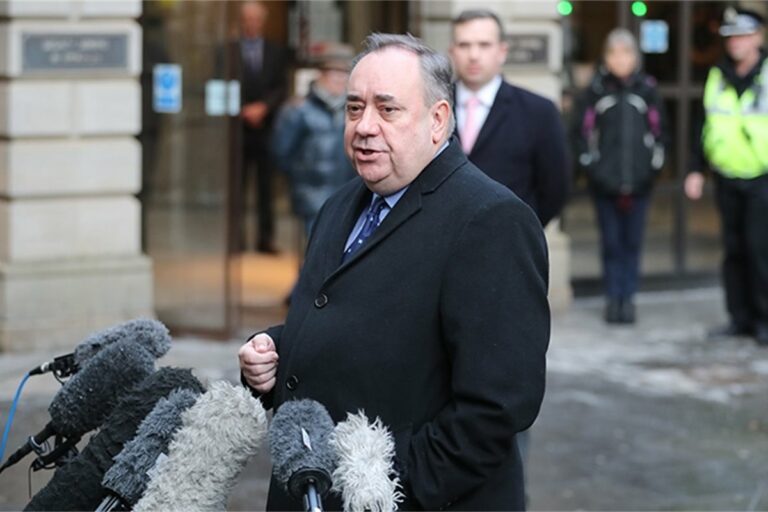We can but speculate about Nicola Sturgeon’s reasons for quitting on Wednesday this week – the fall out over her Gender Recognition Bill, the failure of her independence strategy, a genuine belief she isn’t the right person to take forward her party: who can know for sure? But one thing we can say with some clarity is that her shock departure on Wednesday this week provides a definite and much-needed short-term boost to the Union.
In the days leading up to her resignation, two polls demonstrated why. The first asked people about potential successors within the SNP ranks: fully 69% declared they didn’t know anyone. The second, by Lord Ashcroft, showed that Mrs Sturgeon remains easily the most popular politician in the country. For all that the First Minister was an increasingly divisive figure, there is nobody in the SNP among the runners and riders to replace her who can match her skill set or her profile. Just by being there, Nicola Sturgeon sustained belief and confidence in the case for independence. The SNP will now be shorn of her profile and leadership. With the SNP facing an uncertain future in the months ahead without their talis-woman, it is no wonder that Union advisers to the UK Government expect support for independence to drop.
So much for the short-term – what of further ahead? Much will depend on the identity – and the strategy – adopted by whoever wins the battle to replace Sturgeon. A number of candidates look set to run: Health Secretary Humza Yousaf, former MP Angus Robertson and Finance Secretary Kate Forbes among them. One wise head on the pro-Union figure points out that the campaign ahead may see a divide opening up between radicals and moderates. On the one hand, there will be those who want to show the party’s huge activist base that one more heave is all that freedom requires. There will be a temptation to keep going with Sturgeon’s divisive nationalist agenda: grievance is a hard drug to shake. But there is a divide opening up here between this group and others in the SNP who see the need for a “reset” and for a pitch to national unity. In her valedictory press conference Sturgeon appeared to support the need for the latter. John Swinney’s call on Thursday evening for a leader with a “fresh perspective” did likewise. It adds to the suspicion that the eventual winner may well come from the party’s post-Salmond generation; the cadre of moderate MSPs who have grown up in her shadow and may now wish to start afresh.
We shall see. Within the Labour party, Sturgeon’s resignation has been met with barely disguised elation. They believe thousands of soft SNP voters have only stuck by the party because of their personal allegiance towards “our Nicola”. The party hopes that these voters may now be more susceptible to love-bombing from Sir Keir Starmer. In key Labour target seats, such as East Lothian, Kirkcaldy, and Hamilton, there will be hope that a breakthrough can be made. It was a message made with some force by Labour’s Scottish leader Anas Sarwar at his party conference on Friday (today).
But Labour’s optimism that it can make gains next year should be tempered a little. Because for all that opponents might scent SNP vulnerability, the long-term picture still looks healthy for the Nationalists. Support for independence among the under 40s is running at over 70%. Over 15 year in office, the Nationalists have achieved a kind of cultural hegemony, and have built up a powerful client state around them which backs it up. It has all had a deep effect: research conducted by the think-tank I run, Our Scottish Future, has shown that – politically, morally and practically – much of Scotland simply feels disconnected from the British state. “Not in my name” is a common response to the decisions made by the UK government – and not just by hardline nationalists.
There is no quick fix here. So for Unionists and for Ministers in the UK Government, the mantra must be to hold things steady, and keep things calm, and persist with its current strategy of patient and practical engagement with Scotland. Any hint of triumphalism from Conservative Ministers will be manna from heaven for the Nationalists. Any attempt to pick fights will backfire. The approach set in place by Boris Johnson’s former Union adviser Lord McInnes, to normalise relations between the UK and Scottish Governments, and seek practical avenues for cooperation (such as on two new Freeports in Scotland) is the way to go. It was this strategy which, in the words of one senior Tory figure, “created the space” to allow the UK Government to go ahead and block the SNP’s Gender Recognition Bill without triggering a backlash from Scottish voters. It is a tangible example of how, when the temperature is lowered, even pro-SNP voters can be coaxed to accept, if not yet support, the actions of UK Ministers.
Mrs Sturgeon has gone. Nationalism in Scotland has not. The Union is stronger today than it was this time last week – but the long game to secure Scotland’s place in the Union is still to be won.



